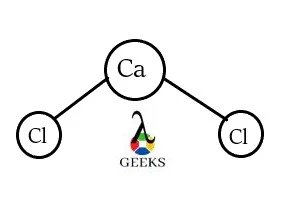Calcium chloride (CaCl2) properties are studied to recognise internal facts about the compound from calcium and Chlorine. Let us define calcium chloride properties below.
Calcium chloride properties refer to the chemical and physical facts that are possessed by the compound calcium chloride.
The internal characteristics formed after the bonding between Calcium and Chlorine are displayed through the properties of Calcium chloride. Properties such as molar mass, melting point, boiling point, viscosity and others would be described throughout this article.
Calcium chloride IUPAC name
The IUPAC name of Calcium chloride is the same as “Calcium dichloride” or “Calcium chloride“.
Calcium chloride chemical formula
The chemical formula of Calcium chloride is Cacl2 where Ca is the symbol of Calcium and Cl is symbol of Chlorine.
Calcium chloride CAS number
The CAS registry number of Calcium chloride is 7440-70-2.
Calcium chloride ChemSpider ID
At ChemSpider database Calcium Chloride has been given 23237. This is an identity number to get free access to the data about the compound.
Calcium chloride chemical classification
- Calcium chloride is chemically classified by its inorganic nature.
- Calcium chloride is an inorganic calcium salt.
- Calcium chloride is highly soluble in water.
- Calcium chloride is considered as a typical deliquescent halide.
Calcium chloride molar mass
The molar mass of Calcium chloride can been obtained as 110.98 g/mol.
Calcium chloride colour
Calcium chloride appears with decent white colour in nature.
Calcium chloride viscosity
The amount of viscosity of Calcium chloride is almost 6 mol kg-1. The viscous levels of the compound in binary aqueous solution are as 0.10, 0.33, 0.65, 0.97, 1.40, and 2.00.
Calcium chloride molar density
Calcium anhydrous has molar density of 2.15 g/cm3.
Calcium chloride melting point
The melting point of solid calcium chloride is 772 °C.
Calcium chloride boiling point
The boiling point of liquid Calcium chloride has been calculated as 1,935 °C.
Calcium chloride state at room temperature
At room temperature calcium chloride, salt can be found in solid state.
Calcium chloride ionic bond
Calcium chloride is made off ionic bonds between calcium and two Chlorine atoms. Here the calcium atom transfers its two valence electrons to make the bond strong with Chlorine instead of sharing electrons partially.

Calcium chloride ionic radius
Ionic radius of the whole compound Calcium chloride is undefined as this factor is applicable for individual elements. The ionic radius of calcium ion (Ca2+) is 114 pm and each Chlorine ion (Cl–) ion is 167 pm in CaCl2.
Calcium chloride electron configurations
Electronic configuration refers to the style of arrangement of the electrons in atomic orbitals. Let us identify the electronic configuration of Ca and Cl atoms in CaCl2.
The Electronic configuration of Ca2+ is 1s2 2s2 2p6 3s2 3p6 and each Cl– ion are 1s2 2s2 2p6 in accordance with the Aufbau principle.
Calcium chloride oxidation state
The oxidation number of CaCl2 is 0. The calculation of oxidation number is given below:
- The oxidation state of Calcium is +2 in CaCl2
- The oxidation state of each Chlorine ion in CaCl2 is -1
- The oxidation state of two Chlorine ion is (2*(-1)) = -2
- The oxidation state of CaCl2 is (+2-2) = 0
Calcium chloride acidity/alkaline
Calcium chloride is neither acidic nor alkaline. It is a neutral salt. In water, this solid salt creates neutral solution.
Is Calcium chloride odourless?
Calcium chloride is found to be odourless in nature in both solid and liquid state.
Is Calcium chloride paramagnetic?
Paramagnetism is the magnetic effect imposed by periodic element and compound when they possess unpaired electrons. Let us find if CaCl2 is paramagnetic or not.
Calcium chloride is not paramagnetic rather the magnetic effect of CaCl2 cannot be defined as the compound is found as neutral in nature and with all paired electrons.
Calcium chloride hydrates
There are 5 types of hydrates of Calcium chloride can be obtained that are listed below:
- Calcium chloride anhydrous (CaCl2)
- Calcium chloride monohydrate (CaCl2. 1H2O)
- Calcium chloride dihydrate (CaCl2. 2H2O)
- Calcium Chloride tetrahydrate (CaCl2. 4H2O)
- Calcium chloride hexahydrate (CaCl2. 4H2O)
Calcium chloride crystal structure
Calcium chloride is found as crystalline solid salt.
Calcium chloride polarity and conductivity
- Calcium chloride is neither polar nor non-polar as the compound is classified as an ionic compound made off one metal and one non-metal element.
- Conductivity of calcium chloride is very high with 64300 amounts at a temperature of 180C.
Calcium chloride reaction with acid
Calcium chloride is reactive in presence of different acids. The reactions are listed below:
- In reaction with dilute sulphuric acid, calcium chloride produces white precipitate of the compound calcium sulphate.
- In reaction with Hydrochloric acid, the compound dissolves in solution and neutralises Hydrochloric acid. CaCl2 + HCl = HCl2 + Ca
- Calcium chloride cannot undergo in reaction with Nitric acid.
Calcium chloride reaction with base
Calcium chloride can be noticed to react with strong base Sodium hydroxide (NaOH). When the compound is mixed with NaOH, Calcium combines with hydroxide ion and makes calcium hydroxide readily.
CaCl2(aq)+NaOH(aq)→Ca(OH)2(s)+NaCl(aq).
Calcium chloride reaction with oxide
Calcium chloride is not reactive in presence of Oxygen and contact with any oxides. However, it has been obtained that the compound gives out calcium sulphate in reaction with sulphur oxide very slowly.
SO2 + CaCl2 = CaSO2 + Cl.
Calcium chloride reaction with metal
Calcium chloride is found to be highly corrosive in contact with bare metals due to its hygroscopic nature. All calcium salts also found to impose aggressive nature in the reaction with metals and their alloys. For example, the reaction of CaCl2 with Ferrum or Iron is
Fe + CaCl2 = Ca + FeCl3.
Conclusion
Calcium chloride is one of the soft and neutral salts of calcium, which shows its hygroscopic nature as its unique identification. The characteristics of CaCl2 that have been identified in this article are concluding that it is unique in the service of chlorides in chemistry due to the presence of calcium metal in it.

Hi…..I am Sarnali Mukherjee, a graduate from the University of Calcutta. I love to teach and share knowledge on chemistry. I have gradually gained interest in article writing since one year ago. I would love to acquire more knowledge on my subject in the future.
Let’s connect through LinkedIn: